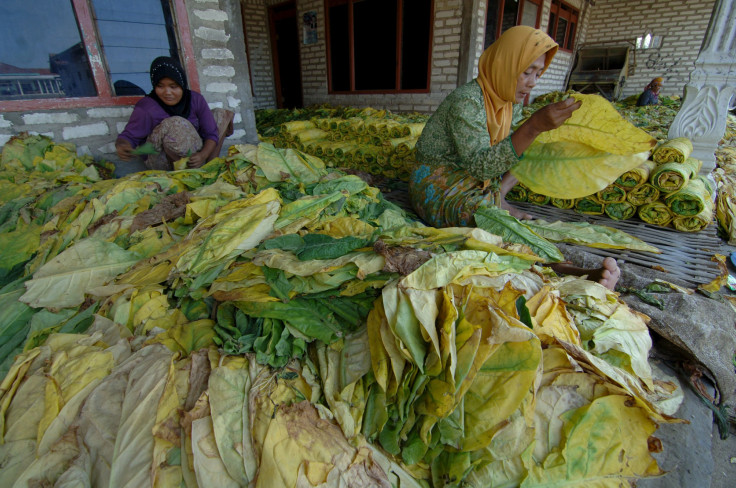Tobacco Farms In Indonesia Employ Thousands Of Children Who Routinely Fall Sick: Report

Despite laws to the contrary, Indonesia, one of the top 10 tobacco producers in the world, continues to have tens of thousands of children working in its tobacco farms, where they come into regular contact with nicotine and other chemicals, which expose them to serious health and safety risks, according to a report released by Human Rights Watch (HRW) Wednesday.
Indonesian law, in line with international laws, prohibits children below 18 years from performing hazardous work and 15 is the standard minimum age for employment in the country, while children between 13 and 15 years of age can perform light work provided it doesn’t interfere with their schooling. However, the Southeast Asian island nation does not specifically ban work handling tobacco as hazardous.
Enforcement of the law is poor, and HRW found many children, some as young as 8 years, working on tobacco farms. All parts of the tobacco plant and leaves contain nicotine, and can be absorbed by the human body through the skin when handling them, especially when the plants are wet.
At least half the children interviewed for the report, called “The Harvest is in My Blood,” experienced one or more symptoms associated with acute nicotine poisoning, or Green Tobacco Sickness, which include nausea, vomiting, headaches and dizziness.
Nadia, a 16-year-old girl, told HRW: “Sometimes I get a headache. Sometimes I’m even throwing up ... [It happens] when we string the leaves because we’re sitting in the middle of a bundle of tobacco. ... It happens when the tobacco is still wet and just coming from the fields. ... Every time it’s the beginning of the season, we’re throwing up.”
Nicotine exposure during childhood and adolescence can also have long-term consequences on brain development, according to the report. “Nicotine exposure in adolescence has been associated with mood disorders, and problems with memory, attention, impulse control, and cognition later in life,” the report said.
A number of child workers — most of them work on small family owned plots or those owned by neighbors or the community, and hence receive modest to no wages — also reported handling chemicals for pesticides and fertilizers used in the farms.
Another 16-year-old, Gusa, spoke about how he fell sick the first time he applied pesticides after mixing the chemicals with his bare hands. “The first time, I was vomiting ... For two weeks, I couldn’t work ... I mixed it with my hands. Suddenly I was dizzy ... It was a terrible feeling. For two weeks, I was always, always vomiting.”
The rights organization interviewed 132 children, between the ages of 8 and 17 years, from farming communities in four provinces of Indonesia that produce about 90 percent of the country’s total tobacco output. HRW also interviewed parents of some of those children, tobacco farmers and traders, health workers and government officials.
Among the large multinational companies that buy tobacco from Indonesia or own tobacco concerns in the country are Altria Group Inc., British American Tobacco, China National Tobacco Corp., Imperial Brands, Japan Tobacco Inc., Philip Morris International and Reynolds American Inc. The report does not indict them for using child labor directly but says they don’t do enough to ensure that tobacco produced using child labor in Indonesia does not enter their supply chain.
According to the International Labour Organization, there are over 1.5 million children working in the agriculture sector in Indonesia, many of them on tobacco plantations.
© Copyright IBTimes 2024. All rights reserved.





















